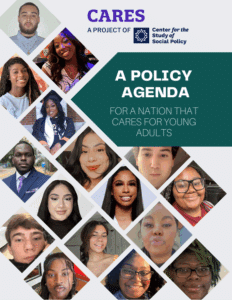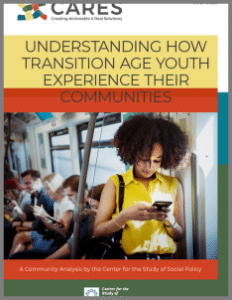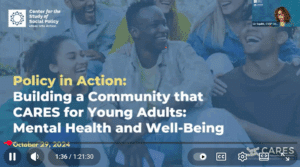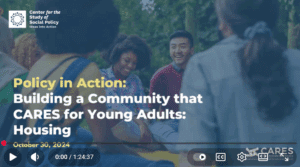The aim of this work is to drastically change the systemic challenges that youth—specifically older or “transition-age” youth (TAY) of color—who are or have been involved with the foster care system experience.
We believe that, working in tandem with the young people most impacted by the foster care system, we can develop intentional, authentic, and anti-racist policy strategies that dismantle racist systems and begin to develop the policies, community resources, and infrastructure that truly support youth in achieving their goals. Through this combination of local system change efforts, building the capacity of youth to take action in their community, and developing and advancing a national policy agenda, we believe that we can affect real change to meaningfully address the needs of youth transitioning out of foster care.
Our Approach
We are accomplishing this work through an approach that centers youth empowerment, policy development, and narrative change. The first and most important step of this work is to establish cohorts of transition-aged youth—or Youth Ambassadors—who will guide and direct CSSP staff, ensuring that our work centers their lived experience and meets their unique needs as young people. Working specifically in Los Angeles, CA, New York, NY, and Atlanta, GA, we will:
- Identify structural challenges.
- Create anti-racist policies.
- Disrupt and replace harmful narratives.
Learn more about this work and the CARES Ambassadors at www.CARES4Power.org.
This work is generously funded by the Conrad N. Hilton Foundation.
KEY PUBLICATIONS
- NATIONAL POLICY AGENDA: A Policy Agenda for a Nation that CARES for Young Adults
- POLICY AGENDA FOR ATLANTA: A Youth-Centered Mental Health and Well-Being Agenda for Atlanta
- POLICY AGENDA FOR LOS ANGELES: A Youth-Centered Housing Policy Agenda for Los Angeles
- POLICY AGENDA FOR NEW YORK CITY: A Youth-Centered Housing Policy Agenda for New York City
- COMMUNITY ANALYSIS: CARES: Understanding How Transition Age Youth Experience their Communities
Additional Resources

On any given day in the United States, there are more than 400,000 children in the foster care system—and more than 82,000 are youth older than 14. These young people, specifically transition-age youth of color, are more likely to experience disparate treatment and outcomes, including that they are more likely to be removed from their homes, less likely to receive family preservation services, and experience longer stays in foster care. Many of these youth ultimately leave whatever care they are in without a family support system, thus making them circumstantially independent or lacking the social connections and concrete supports that guide young people into thriving adulthood. These youth often feel compelled to remain tied to the child welfare system in order to receive essential supports, because holistic policy solutions that can support them from care to independence are not in place.
Deep rooted and persistent systemic and structural inequities across the full ecosystem in which these young people live both create and compound these circumstances. Despite best intentions, public systems too often end up harming rather than helping youth. These young people who grow up under the overly watchful eye of the child welfare system are denied the experiences and opportunities that will empower them and set them on a path toward thriving adulthood. The good intentions of supporting older youth within the child welfare system have often minimized or even undermined the community and individual relationships and supports crucial to ensuring that youth can be healthy, successful, and connected in the communities where they live. It is our belief that, with the right combination of innovation, authentic engagement of youth, and community collaboration, we can start to change that.
In 2021, the Center for the Study of Social Policy (CSSP) launched a three-year endeavor, Designing and Implementing Meaningful, Anti-Racist Supports for Transition-Age Youth (TAY), funded by the Conrad N. Hilton Foundation. The aim of this work is to drastically change the systemic challenges that youth—specifically older or “transition-age” youth of color—who are or have been involved with the foster care system experience. We intend to do this through an approach that centers youth empowerment, policy development, and narrative change.
Learn more about this work and the CARES Ambassadors at www.CARES4Power.org.
By recruiting three cohorts of Youth Ambassadors, selected in Los Angeles, CA, New York, NY, and Atlanta, GA (each of the cities in which we are conducting our work) to function as our advisors, we will ensure that our work is both authentically youth-serving AND empowers the young people to develop important leadership skills. Each cohort will be deeply involved in all steps of the work and centered in all parts of the co-design process. Their lived experience is the most important resource we have to authentically proceed in this work.
Learn more about this work and the CARES Ambassadors at www.CARES4Power.org.
Through a community analysis, an adaptation of our Institutional Analysis methodology, we are seeking to understand how communities are able to affirm, include, and support youth transitioning out of foster care. Investigative teams will apply qualitative tools and analysis to understand how communities are organized to support youth aging out of the child welfare system. This includes examining current concepts, theories, policies, initiatives, and accountability mechanisms that serve to create the current conditions youth are experiencing and provide the opportunities for improvement.
Learn more about this work and the CARES Ambassadors at www.CARES4Power.org.
Working directly with the Youth Ambassadors, we will co-design a national anti-racist and intersectional policy agenda. This agenda will center youth experiences and prioritize the needs of youth currently and previously involved with the child welfare system. Reflecting the goals and priorities of the Youth Ambassadors, the agenda will include policies beyond child welfare as youth are impacted by multiple systems. The Youth Ambassadors will also work in their state and local communities to advance anti-racist and international policies.
Learn more about this work and the CARES Ambassadors at www.CARES4Power.org.
To change the existing negative narrative—or damage imagery—about youth who are or who have been involved in the foster care system, we will co-design a national narrative change campaign that will identify, dismantle, and, ultimately, replace harmful damage imagery with a narrative that affirms the valuable and valued lived experience of youth who have been touched by the foster care system.
Learn more about this work and the CARES Ambassadors at www.CARES4Power.org.
 We believe that we owe young adults meaningful opportunities, including fulfilling jobs that pay a living wage, have predictable hours, and provide workplace protections; housing that is safe, healthy, and stable; health care that is affordable and affirming, and includes supports for managing stress, anxiety, and other mental health needs; and for those who are parenting, affordable and responsive child care. This policy agenda reimagines how policy supports young people. A product of a collaboration between CARES Ambassadors and CSSP, the agenda seeks to advance policy that supports young people in their families and communities, respects and affirms their whole identity, and sets us all up for success. Learn more about A Policy Agenda for a Nation that CARES for Young Adults here.
We believe that we owe young adults meaningful opportunities, including fulfilling jobs that pay a living wage, have predictable hours, and provide workplace protections; housing that is safe, healthy, and stable; health care that is affordable and affirming, and includes supports for managing stress, anxiety, and other mental health needs; and for those who are parenting, affordable and responsive child care. This policy agenda reimagines how policy supports young people. A product of a collaboration between CARES Ambassadors and CSSP, the agenda seeks to advance policy that supports young people in their families and communities, respects and affirms their whole identity, and sets us all up for success. Learn more about A Policy Agenda for a Nation that CARES for Young Adults here.
 Using an adaptation of CSSP’s Institutional Analysis methodology, CARES conducted a strategic analysis designed to understand how communities are able to affirm, include, and support youth transitioning out of foster care. Investigative teams applied qualitative tools and analysis to understand how communities are organized to support youth aging out of the child welfare system. As part of the analysis, teams also examined current concepts, theories, policies, initiatives, and accountability mechanisms that serve to create the current conditions youth are experiencing and provide the opportunities for improvement.
Using an adaptation of CSSP’s Institutional Analysis methodology, CARES conducted a strategic analysis designed to understand how communities are able to affirm, include, and support youth transitioning out of foster care. Investigative teams applied qualitative tools and analysis to understand how communities are organized to support youth aging out of the child welfare system. As part of the analysis, teams also examined current concepts, theories, policies, initiatives, and accountability mechanisms that serve to create the current conditions youth are experiencing and provide the opportunities for improvement.
Learn more about Understanding How Transition Age Youth Experience Their Communities here.
 This session discussed youth-centered policy recommendations for mental health and well-being, co-designed with young people who have transitioned out of foster care. During the conversation, we heard reflections on the importance of policies for mental health and well-being and the Atlanta CARES mental health and well-being policy agenda. Watch the session here: Policy in Action – Building a Community that CARES for Young Adults: Mental Health and Well-Being
This session discussed youth-centered policy recommendations for mental health and well-being, co-designed with young people who have transitioned out of foster care. During the conversation, we heard reflections on the importance of policies for mental health and well-being and the Atlanta CARES mental health and well-being policy agenda. Watch the session here: Policy in Action – Building a Community that CARES for Young Adults: Mental Health and Well-Being
This session discussed youth-centered policy recommendations for housing—developed in collaboration with young people who have transitioned out of foster care. During the conversation, we heard reflections on the importance of housing policies and discussed the NYC and L.A. CARES policy agendas and the recommendations they elevate. Watch the session here: Policy in Action – Building a Community that CARES for Young Adults: Housing Policies for NYC & L.A.








